【Vantiq精品】译文 343764-Vantiq_Strategy_-_2.11修改(2)
a modest proposal中英对照
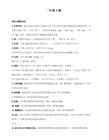
然而我的目的远不止限于救治那些公开宣称的乞丐的孩子,我所说的范围要大得多,包括所有那些在某个年代出生,其父母与那些在街上要求我们大发慈悲的乞丐一样,无力养活他们的幼儿。
As to my own part, having turned my thoughts for many years upon this important subject, and maturely weighed the several schemes of other projectors, I have always found them grossly mistaken in the computation. It is true, a child just dropped from its dam may be supported by her milk for a solar year, with little other nourishment; at most not above the value of 2s., which the mother may certainly get, or the value in scraps, by her lawful occupation of begging; and it is exactly at one year old that I propose to provide for them in such a manner as instead of being a charge upon their parents or the parish, or wanting food and raiment for the rest of their lives, they shall on the contrary contribute to the feeding, and partly to the clothing, of many thousands.
纳瓦尔宝典英语版
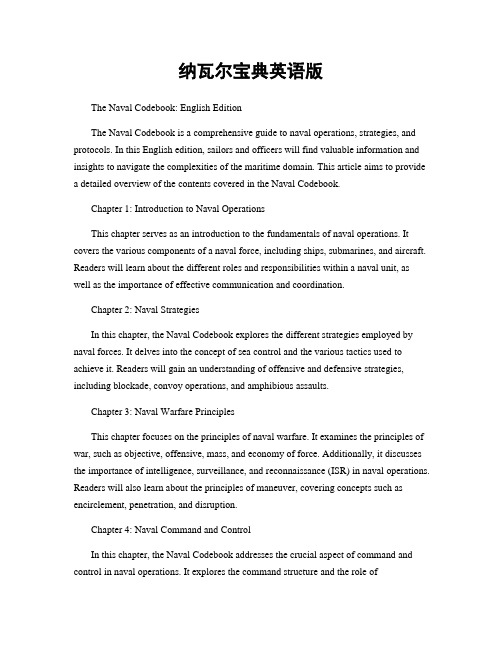
纳瓦尔宝典英语版The Naval Codebook: English EditionThe Naval Codebook is a comprehensive guide to naval operations, strategies, and protocols. In this English edition, sailors and officers will find valuable information and insights to navigate the complexities of the maritime domain. This article aims to provide a detailed overview of the contents covered in the Naval Codebook.Chapter 1: Introduction to Naval OperationsThis chapter serves as an introduction to the fundamentals of naval operations. It covers the various components of a naval force, including ships, submarines, and aircraft. Readers will learn about the different roles and responsibilities within a naval unit, as well as the importance of effective communication and coordination.Chapter 2: Naval StrategiesIn this chapter, the Naval Codebook explores the different strategies employed by naval forces. It delves into the concept of sea control and the various tactics used to achieve it. Readers will gain an understanding of offensive and defensive strategies, including blockade, convoy operations, and amphibious assaults.Chapter 3: Naval Warfare PrinciplesThis chapter focuses on the principles of naval warfare. It examines the principles of war, such as objective, offensive, mass, and economy of force. Additionally, it discusses the importance of intelligence, surveillance, and reconnaissance (ISR) in naval operations. Readers will also learn about the principles of maneuver, covering concepts such as encirclement, penetration, and disruption.Chapter 4: Naval Command and ControlIn this chapter, the Naval Codebook addresses the crucial aspect of command and control in naval operations. It explores the command structure and the role ofcommanders at various levels. The chapter also covers the importance of effective decision-making, communication, and information sharing in naval command and control.Chapter 5: Naval LogisticsLogistics is an integral part of any naval operation, and this chapter provides a comprehensive overview of the subject. It covers the planning, acquisition, and distribution of resources, including fuel, ammunition, and supplies. Readers will gain insights into the importance of sustainment and the challenges faced in maintaining operational readiness.Chapter 6: Naval CommunicationsEffective communication is vital for successful naval operations, and this chapter delves into the various communication methods and systems used by naval forces. It covers both internal communication within a naval unit and external communication with other units and headquarters. The chapter also highlights the significance of encryption and secure communication in naval operations.Chapter 7: Naval IntelligenceIntelligence gathering and analysis play a crucial role in naval operations, and this chapter focuses on the principles and methods of naval intelligence. It covers the collection and processing of information, including signals intelligence, human intelligence, and imagery intelligence. Readers will also gain an understanding of the importance of intelligence fusion and analysis in decision-making.Chapter 8: Naval Safety and SecuritySafety and security are paramount in naval operations, and this chapter addresses the measures and procedures to ensure the well-being of personnel and the integrity of naval assets. It covers topics such as force protection, damage control, and emergency response. Readers will also learn about the importance of adhering to safety and security protocols to mitigate risks and enhance operational effectiveness.ConclusionThe Naval Codebook: English Edition provides a comprehensive and detailed guide to naval operations, strategies, and protocols. It covers a wide range of topics, from the fundamentals of naval operations to advanced concepts of warfare and logistics. Sailors and officers will find this codebook an indispensable resource to enhance their understanding and proficiency in naval operations.。
Pub Talk and The King's English 英译中(译文)
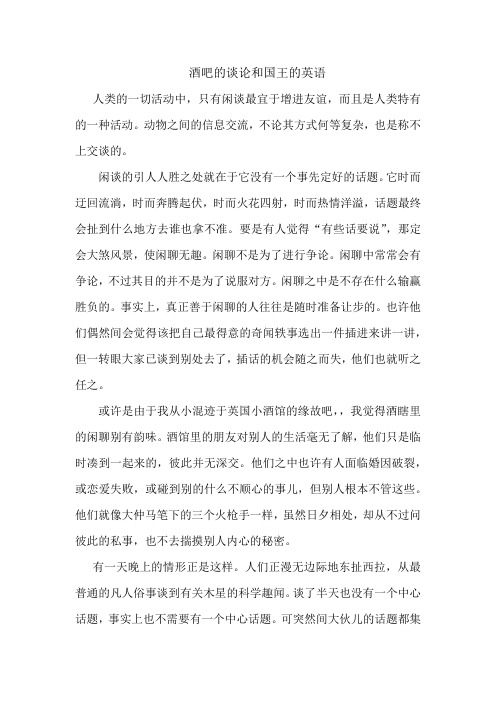
酒吧的谈论和国王的英语人类的一切活动中,只有闲谈最宜于增进友谊,而且是人类特有的一种活动。
动物之间的信息交流,不论其方式何等复杂,也是称不上交谈的。
闲谈的引人人胜之处就在于它没有一个事先定好的话题。
它时而迂回流淌,时而奔腾起伏,时而火花四射,时而热情洋溢,话题最终会扯到什么地方去谁也拿不准。
要是有人觉得“有些话要说”,那定会大煞风景,使闲聊无趣。
闲聊不是为了进行争论。
闲聊中常常会有争论,不过其目的并不是为了说服对方。
闲聊之中是不存在什么输赢胜负的。
事实上,真正善于闲聊的人往往是随时准备让步的。
也许他们偶然间会觉得该把自己最得意的奇闻轶事选出一件插进来讲一讲,但一转眼大家已谈到别处去了,插话的机会随之而失,他们也就听之任之。
或许是由于我从小混迹于英国小酒馆的缘故吧,,我觉得酒瞎里的闲聊别有韵味。
酒馆里的朋友对别人的生活毫无了解,他们只是临时凑到一起来的,彼此并无深交。
他们之中也许有人面临婚因破裂,或恋爱失败,或碰到别的什么不顺心的事儿,但别人根本不管这些。
他们就像大仲马笔下的三个火枪手一样,虽然日夕相处,却从不过问彼此的私事,也不去揣摸别人内心的秘密。
有一天晚上的情形正是这样。
人们正漫无边际地东扯西拉,从最普通的凡人俗事谈到有关木星的科学趣闻。
谈了半天也没有一个中心话题,事实上也不需要有一个中心话题。
可突然间大伙儿的话题都集中到了一处,中心话题奇迹般地出现了。
我记不起她那句话是在什么情况下说出来的——她显然不是预先想好把那句话带到酒馆里来说的,那也不是什么非说不可的要紧话——我只知道她那句话是随着大伙儿的话题十分自然地脱口而出的。
“几天前,我听到一个人说‘标准英语’这个词语是带贬义的批评用语,指的是人们应该尽量避免使用的英语。
”此语一出,谈话立即热烈起来。
有人赞成,也有人怒斥,还有人则不以为然。
最后,当然少不了要像处理所有这种场合下的意见分歧一样,由大家说定次日一早去查证一下。
于是,问题便解决了。
孙子兵法原文英文对照版
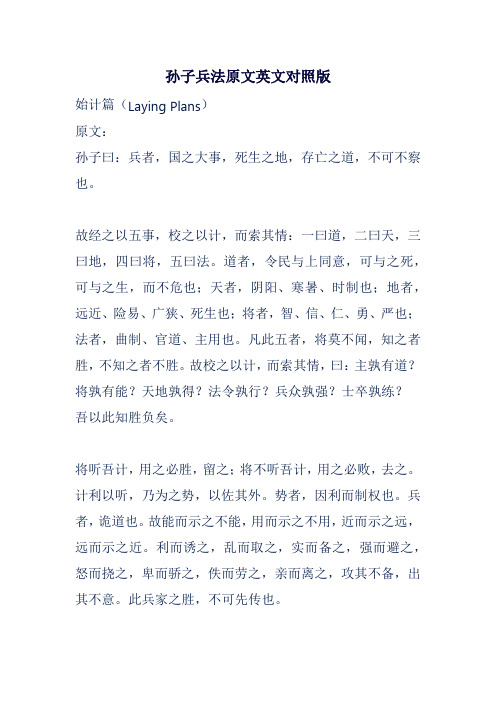
孙子兵法原文英文对照版始计篇(Laying Plans)原文:孙子曰:兵者,国之大事,死生之地,存亡之道,不可不察也。
故经之以五事,校之以计,而索其情:一曰道,二曰天,三曰地,四曰将,五曰法。
道者,令民与上同意,可与之死,可与之生,而不危也;天者,阴阳、寒暑、时制也;地者,远近、险易、广狭、死生也;将者,智、信、仁、勇、严也;法者,曲制、官道、主用也。
凡此五者,将莫不闻,知之者胜,不知之者不胜。
故校之以计,而索其情,曰:主孰有道?将孰有能?天地孰得?法令孰行?兵众孰强?士卒孰练?吾以此知胜负矣。
将听吾计,用之必胜,留之;将不听吾计,用之必败,去之。
计利以听,乃为之势,以佐其外。
势者,因利而制权也。
兵者,诡道也。
故能而示之不能,用而示之不用,近而示之远,远而示之近。
利而诱之,乱而取之,实而备之,强而避之,怒而挠之,卑而骄之,佚而劳之,亲而离之,攻其不备,出其不意。
此兵家之胜,不可先传也。
英文对照(Translated by Lionel Giles)Sun Tzu said: The art of war is of vital importance to the State. It is a matter of life and death, a road either to safety or to ruin. Hence it is a subject of inquiry which can on no account be neglected.The art of war, then, is governed by five constant factors, to be taken into account in one's deliberations, when seeking to determine the conditions obtaining in the field. These are: (1) The Moral Law; (2) Heaven; (3) Earth; (4) The Commander; (5) Method and discipline.The Moral Law causes the people to be in complete accord with their ruler, so that they will follow him regardless of their lives, undismayed by any danger. Heaven signifies night and day, cold and heat, times and seasons. Earth comprises distances, great and small; danger and security; open ground and narrow passes; the chances of life and death. The Commander stands for the virtues of wisdom, sincerely, benevolence, courage and strictness. By method and discipline are to be understood the marshaling of the army in its proper subdivisions, the graduations of rankamong the officers, the maintenance of roads by which supplies may reach the army, and the control of military expenditure.These five heads should be familiar to every general: he who knows them will be victorious; he who knows them not will fail. Therefore, in your deliberations, when seeking to determine the military conditions, let them be made the basis of a comparison, in this wise: (1) Which of the two sovereigns is imbued with the Moral law? (2) Which of the two generals has most ability? (3) With whom lie the advantages derived from Heaven and Earth? (4) On which side is discipline most rigorously enforced? (5) Which army is stronger? (6) On which side are officers and men more highly trained? By means of these seven considerations I can forecast victory or defeat.The general that hearkens to my counsel and acts upon it, will conquer: let such a one be retained in command! The general that hearkens not to my counsel nor acts upon it, will suffer defeat: let such a one be dismissed! While heading the profit of my counsel, avail yourself also of anyhelpful circumstances over and beyond the ordinary rules. According as circumstances are favorable, one should modify one's plans. All warfare is based on deception. Hence, when able to attack, we must seem unable; when using our forces, we must seem inactive; when we are near, we must make the enemy believe we are far away; when far away, we must make him believe we are near.。
世界名著翻译佳作--Vanity

世界名著翻译佳作--Vanity Fair名利场BEFORE THE CURTAIN开幕以前的⼏句话As the manager of the Performance sits before the curtain on the boards and looks into the Fair, a feeling of profound melancholy comes over him in his survey of the bustling place.领班的坐在戏台上幌⼦前⾯,对着底下闹哄哄的市场,瞧了半晌,⼼⾥不觉悲惨起来。
There is a great quantity of eating and drinking, making love and jilting, laughing and the contrary, smoking, cheating, fighting, dancing and fiddling;市场上的⼈有的在吃喝,有的在调情,有的得了新宠就丢了旧爱;有在笑的,也有在哭的,还有在抽烟的,打架的,跳舞的,拉提琴的,诓骗哄⼈的。
fiddling--[transitive] British English informalSCC to give false information about something, in order to avoid paying money or to get extra money:--[intransitive] to play a violinfiddle around phrasal verbto waste time doing unimportant thingsthere are bullies pushing about, bucks ogling the women, knaves picking pockets, policemen on the look-out, quacks (OTHER quacks, plague take them!) bawling in front of their booths, and yokels looking up at the tinselled dancers and poor old rouged tumblers, while the light-fingered folk are operating upon their pockets behind.有些是到处横⾏的强梁汉⼦;有些是对⼥⼈飞眼⼉的花花公⼦,也有扒⼉⼿和到处巡逻的警察,还有⾛江湖吃⼗⽅的,在⾃⼰摊⼦前⾯扯起嗓⼦嚷嚷(这些⼈偏和我同⾏,真该死!),跳舞的穿着浑⾝发亮的⾐服,可怜的翻⽄⽃⽼头⼉涂着两腮帮⼦胭脂,引得那些乡下佬睁着眼瞧,不提防后⾯就有三只⼿的家伙在掏他们的⼝袋。
参考译文(textfurtherreading)

Unit 3参考译文[1组成――主共和国和中华人民共和国的云南省。
[2大湄公河次区域资源[3近乎自给自足的农耕生活方式。
[4方式。
例如,超过75%[5上开发和利用。
[6保护人们一直以来赖以生存的环境。
大湄公河次区域规划[7]自1992有冲突。
事实上,东盟和大湄公河次区域都具有高度互补性,都朝着同一个目标迈进,只是在一些计划和安排上有些许的不同。
[9]再次是战略和目标差异。
东盟在提高生活水平以及缩短最初的成员国与较新加入(相对较平穷)的成员国之间的贫富差距方面有着清晰的目标。
东盟的框架设定了合作的目标和原则,也划分出了优先发展的领域:基础设施、贸易和投资活动、农业、林业和矿产、工业、旅游、人力资源开发、科学和技术。
大湄公河次区域合作的领域是运输、电信、能源,环境、旅游、人力资源开发、贸易便利、投资和农业。
[10]正如在《东盟宣言》中规定的东盟的目标和目的是:(2)本着平等和合作的精神,共同努力加速该区域经济的增长、社会的进步和文化的发展,为东南亚国家拥有一个繁荣、和平的大家庭而夯实基础。
[11]该区域的国家遵循联合国宪章章程,持久地遵守司法的公正和法律规定以促进区域的和平与稳定;为促进经济、社会、文化、技术、科学和行政领域内的共同利益而积极合作和相互援助;在教育、职业、技术和行政领域以提供培训和研究设备的方式相互援助;为更大地利用他们的农业和工业、扩大贸易(包括对国际商品贸易问题的研究)、改善交通运输和通信设施、以及提高人们的生活水平等方面进行更有效地合作;加强东南亚研究、对拥有相同目标和目的的现有的国际和地区组织保持密切和有利的合作,并在他们中寻求所有进一步密切合作的途径。
[12]到2012年,大湄公河次区域将要发展五个战略目标:加强基础设施联接;促进跨境贸易、投资和旅游;增加私营部门的参与和竞争;发展人力资源和技能;保护环境、促进对共享自然资源的可持续性利用。
[13](3)到2012年要达到四个目标:加速可持续性经济的增长;减少贫困和收入的悬殊;提升生活的质量;加强对环境和自然资源的可持续性管理。
Unit-7-Learning-Strategies课文翻译大学体验英语一

Unit-7-Learning-Strategies课文翻译(fānyì)大学体验英语一Unit-7-Learning-Strategies 课文翻译大学体验(tǐyàn)英语一Unit 7 Learning StrategiesPassage A Not Just a Job, an Adventure: Undergraduate ResearchSophia Stella, a sophomore at Columbia's School of Engineering, is one of many undergraduates who become involved, one way or another, in research performed at the university. Some do it for academic credit, some for money, some just for experience. Students and professors agree that an undergraduate research project can be uniquely beneficial to both parties.Ideally, undergraduate research is an opportunity for the kind of intensive study that can expand the mind in ways traditional courses can't. Economics Professor Ralph Edison says: "To really understand a discipline you have to get the feeling that knowledge isn't just out there and you passively have to absorb it, but rather that it's constantly beingcreated and we're constantly rethinking things... When students see a discipline as evolving rather than fixed, they usually get a lot more excited about learning because they see that it's an ongoing process." He points out that research can be exciting because "a research project really gives students an opportunity to answer real-life questions that we don't know the answers to."Research also spurs independent thinking and intellectual confidence in students. Amelia, a graduate student in computer science, says, "You had to go out and learn on your own. You weren't going to be spoon-fed." Her fond memories of work as an undergraduate researcher played an important role in her decision to leave her Wall Street programming job and return to Columbia as a graduate student.Arthur Hannah, a political science graduate of Columbia College says undergraduate research "felt like a whole new mode of learning." Instead of looking for the knowledge we do have, he says, research forces students to look for knowledge we don't have. It's a process of looking for holes and trying to plug them, which is completely different from the classroom experience of learning what others already know. He also describes how creating a piece of original research instilled a "pride of authorship" in his work, something he hadn't found in his regular classes.Most undergraduates doing research are working for credit. They register for a semester-long course and do a project for a professor who gives them a grade for their efforts. In some departments a research project might constitute an honors thesis.Some students do research for pay. Taken simply as a form of employment, it's one of the most desirable jobs available to undergraduates. Stella says, "I need some kind of income, and I'd rather work here than in the cafeteria"; paid research work gives her an opportunity to transform a work-study job into an engaging aspect of her education. The money for her wages is available because of a program started this year providing $100 000 to fund undergraduate research. This funding is intended to support about 50 undergraduates in work-study research positions.Other students do research not for credit or for money but simply on a volunteer basis. Usually, these are students pursuing a career that requires some demonstration of altruistic commitment, such as medicine.As Economics Professor Ralph Edison says: "Undergraduate research can become a valuable part of education. It's a real and valuable privilege. It hasto remain an extraordinary undertaking for extraordinary people in extraordinary circumstances."A篇大学生在校搞研究(yánjiū)哥伦比亚大学工程学院二年级学生(xuésheng)索菲亚·斯黛拉,是众多以各种方式在校参与研究工作(gōngzuò)的学生之一。
《孙子兵法》赏析英文版

Soldiers, even cunning paths
Summary
Combining frontal combat with surprise attacks
Detailed description
Sun Tzu's Art of War emphasizes the importance of combining frontal combat with surprise attacks in warfare. Frontal combat can cause immense pressure on the enemy, while surprise attacks can unexpectedly strike the enemy and achieve victory.
Europe was one of the earliest destinations for the dissemination of Sun Tzu's Art of War, with its influence mainly concentrated in the military field.
Content structure
Sun Tzu's Art of War consists of 13 articles, covering multiple aspects such as strategy, tactics, and military governance, with comprehensive and systematic content.
To achieve perfect harmony and extraordinary victory
Bain战略分析工具英文版
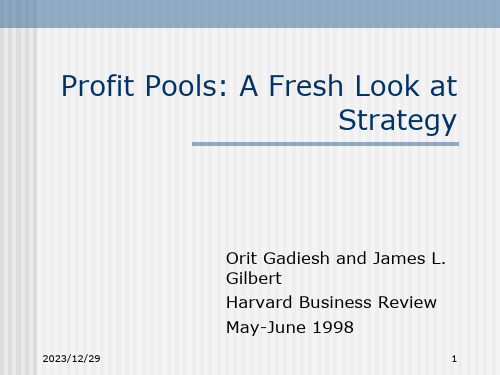
Creating and managing a profit pool
Profit pool analysis may indicate new opportunities or threats
Imperatives
Be open to a new perspective on your business and industry
0
0
other components
personal computers
microprocessors
share of industry revenue
software
peripherals
Value chain focus Axes
Vertical—operating margin Horizontal—share of industry data
service repair
100%
aftermarket parts auto rental
2023/12/29
4
Profit Pools: Company Examples
Companies
Automakers U-Haul Elevators (OTIS) Harley Davidson
Polaroid
Current strategy
Change product focus
Change Customer focus
2023/12/29
15
Application to our cases
Retail industry (Wal*Mart) Soft drink industry (Coca-Cola and
a modest proposal译文

题目:《一个荒谬的建议》译文1. 引言在这个伟大的时代,我们不仅需要思考和解决世界上的各种问题,更需要以开放的心态去深入研究并探索各种看似不切实际的建议。
乔纳森·斯威夫特的《一个荒谬的建议》就是一个经典的例子。
这篇小说不仅在文学上具有重要意义,同时也探讨了当时社会的各种问题,具有深刻的思考意义。
本文将为读者带来《一个荒谬的建议》的中文译文,以期引发更多人对这一经典文学作品的深入思考。
2. 《一个荒谬的建议》的中文译文《一个荒谬的建议》是爱尔兰作家乔纳森·斯威夫特于1729年匿名发表的一篇政治讽刺小品。
这篇作品以一种荒诞、夸张的形式,探讨了英国对爱尔兰的殖民统治,以及当时社会贫困和饥荒等问题。
在这篇文章中,斯威夫特提出了一种令人发指的“解决”方法,即让爱尔兰的穷人通过吃掉自己的婴儿来解决饥荒问题。
这种建议不仅具有极强的讽刺意味,更是对当时政府和统治阶层的无情嘲讽。
3. 深度解读《一个荒谬的建议》从表面上看似乎是一篇纯粹的讽刺文学作品,然而在深度解读之后,我们会发现其中蕴含着对当时社会问题的深刻揭露。
斯威夫特通过这一荒谬的建议,实际上是在讽刺当时政府和统治阶层对待爱尔兰的殖民政策。
他以一种特殊的方式,表达了对当时社会道德和人性的担忧。
作为读者,我们应该在笑中思考,不仅仅是对文章本身的娱乐,更是对当时社会的反思。
4. 思考与总结乔纳森·斯威夫特的《一个荒谬的建议》是一部充满深意的文学作品,它不仅仅停留在文字的表面,更是包含了对当时社会问题的批判和思考。
在当今社会,我们同样需要以开放、深入的心态去面对各种问题,去探索看似荒谬的建议背后的真正意义。
只有通过深入的思考和讨论,我们才能更好地理解世界,更好地解决问题。
5. 个人观点对于《一个荒谬的建议》,我个人认为这篇作品不仅仅是一篇文学作品,更是一种对当时社会问题的批判和反思。
斯威夫特以一种夸张的方式,向读者展现了当时政治和社会的黑暗一面。
Fantastic Piece of Logic译文翻译(可打印修改)
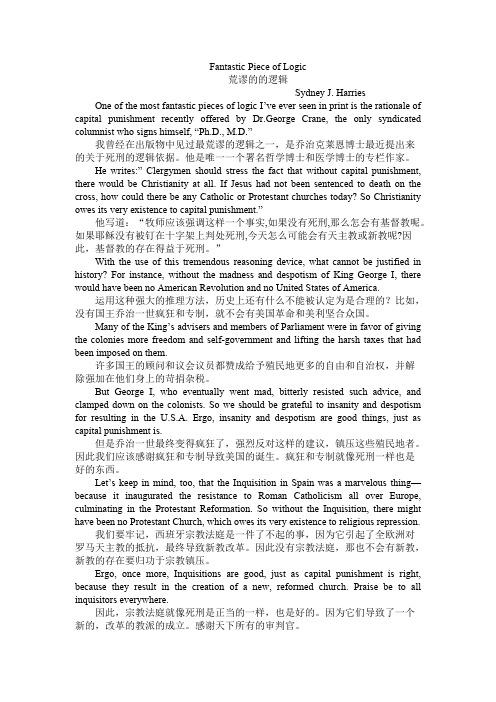
Fantastic Piece of Logic荒谬的的逻辑Sydney J. Harries One of the most fantastic pieces of logic I’ve ever seen in print is the rationale of capital punishment recently offered by Dr.George Crane, the only syndicated columnist who signs himself, “Ph.D., M.D.”我曾经在出版物中见过最荒谬的逻辑之一,是乔治克莱恩博士最近提出来的关于死刑的逻辑依据。
他是唯一一个署名哲学博士和医学博士的专栏作家。
He writes:” Clergymen should stress the fact that without capital punishment, there would be Christianity at all. If Jesus had not been sentenced to death on the cross, how could there be any Catholic or Protestant churches today? So Christianity owes its very existence to capital punishment.”他写道:“牧师应该强调这样一个事实,如果没有死刑,那么怎会有基督教呢。
如果耶稣没有被钉在十字架上判处死刑,今天怎么可能会有天主教或新教呢?因此,基督教的存在得益于死刑。
”With the use of this tremendous reasoning device, what cannot be justified in history? For instance, without the madness and despotism of King George I, there would have been no American Revolution and no United States of America.运用这种强大的推理方法,历史上还有什么不能被认定为是合理的?比如,没有国王乔治一世疯狂和专制,就不会有美国革命和美利坚合众国。
阅读教程winwinstrategy课文翻译

阅读教程winwinstrategy课文翻译课文:The Silk Road is a traffic route in the ancient times connecting China and Eurasia. This trade route focuses on the trade of silk, hence the name" the Silk Road". As an international trade channel and a bridge of cultural exchanges, the Silk Road effectively improved the economic and cultural exchanges and development between the East and the West, exerting a profound impact on the progress of the world civilization.Nowadays, under the new historical circumstances, our country proposes the strategy of" One Belt, One Road" (namely the Silk Road Economic Belt and the 21st-century Maritime Silk Road). The strategy of" One Belt, One Road" focuses on cooperation and mutual benefits, emphasizing mutual benefits, win-win, as well as common development of the related countries. Once proposed, the strategy has received positive responses from the related countries along the road.翻译:作为国际贸易渠道和文化交流桥梁,丝绸之路有效地改善了e的经济和文化交流和发展AST和WEST,对世界文明的进展产生深远的影响.如今,在新的历史条件下,我国提出了“一带一路”(即丝绸之路经济带和21世纪海上丝绸之路)战略。
大学英语unit4 A Virtual Life原文与翻译
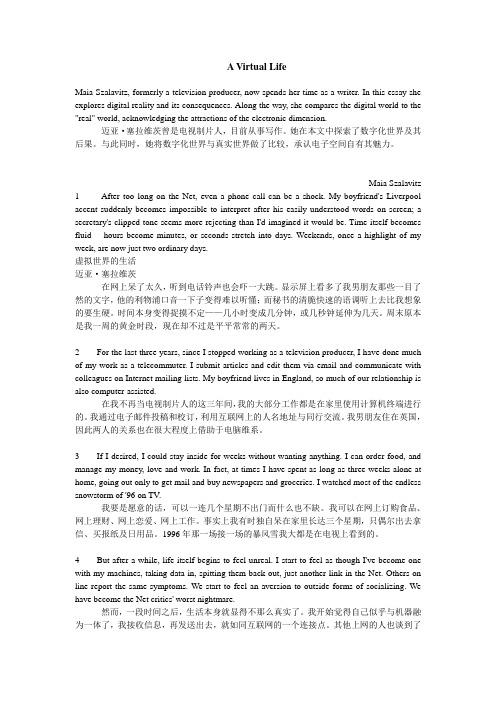
A Virtual LifeMaia Szalavitz, formerly a television producer, now spends her time as a writer. In this essay she explores digital reality and its consequences. Along the way, she compares the digital world to the "real" world, acknowledging the attractions of the electronic dimension.迈亚·塞拉维茨曾是电视制片人,目前从事写作。
她在本文中探索了数字化世界及其后果。
与此同时,她将数字化世界与真实世界做了比较,承认电子空间自有其魅力。
Maia Szalavitz 1 After too long on the Net, even a phone call can be a shock. My boyfriend's Liverpool accent suddenly becomes impossible to interpret after his easily understood words on screen; a secretary's clipped tone seems more rejecting than I'd imagined it would be. Time itself becomes fluid -- hours become minutes, or seconds stretch into days. Weekends, once a highlight of my week, are now just two ordinary days.虚拟世界的生活迈亚·塞拉维茨在网上呆了太久,听到电话铃声也会吓一大跳。
瑞普·凡·温克尔Rip_Van_Winkle中英文对照与summary
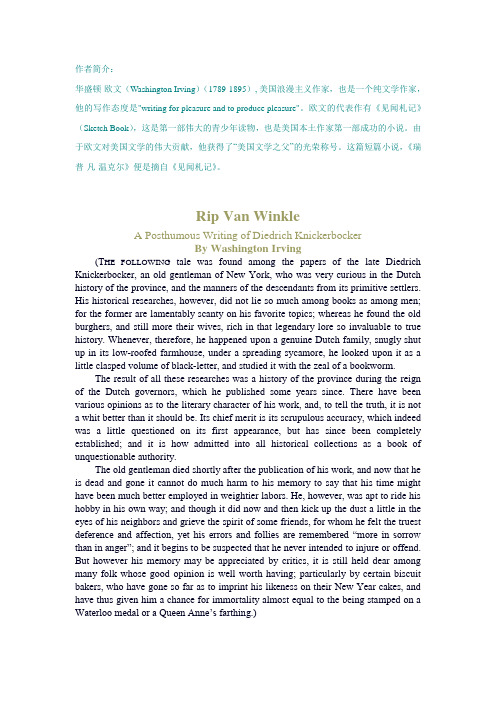
作者简介:华盛顿·欧文(Washington Irving)(1789-1895), 美国浪漫主义作家,也是一个纯文学作家,他的写作态度是"writing for pleasure and to produce pleasure"。
欧文的代表作有《见闻札记》(Sketch Book),这是第一部伟大的青少年读物,也是美国本土作家第一部成功的小说。
由于欧文对美国文学的伟大贡献,他获得了“美国文学之父”的光荣称号。
这篇短篇小说,《瑞普·凡·温克尔》便是摘自《见闻札记》。
Rip Van WinkleA Posthumous Writing of Diedrich KnickerbockerBy Washington Irving(T HE FOLLOWING tale was found among the papers of the late Diedrich Knickerbocker, an old gentleman of New York, who was very curious in the Dutch history of the province, and the manners of the descendants from its primitive settlers. His historical researches, however, did not lie so much among books as among men; for the former are lamentably scanty on his favorite topics; whereas he found the old burghers, and still more their wives, rich in that legendary lore so invaluable to true history. Whenever, therefore, he happened upon a genuine Dutch family, snugly shut up in its low-roofed farmhouse, under a spreading sycamore, he looked upon it as a little clasped volume of black-letter, and studied it with the zeal of a bookworm.The result of all these researches was a history of the province during the reign of the Dutch governors, which he published some years since. There have been various opinions as to the literary character of his work, and, to tell the truth, it is not a whit better than it should be. Its chief merit is its scrupulous accuracy, which indeed was a little questioned on its first appearance, but has since been completely established; and it is how admitted into all historical collections as a book of unquestionable authority.The old gentleman died shortly after the publication of his work, and now that he is dead and gone it cannot do much harm to his memory to say that his time might have been much better employed in weightier labors. He, however, was apt to ride his hobby in his own way; and though it did now and then kick up the dust a little in the eyes of his neighbors and grieve the spirit of some friends, for whom he felt the truest deference and affection, yet his errors and follies are remembered “more in sorrow than in anger”; and it begins t o be suspected that he never intended to injure or offend. But however his memory may be appreciated by critics, it is still held dear among many folk whose good opinion is well worth having; particularly by certain biscuit bakers, who have gone so far as to imprint his likeness on their New Year cakes, and have thus given him a chance for immortality almost equal to the being stamped on a Waterloo medal or a Queen Anne’s farthing.)By Woden, God of Saxons,From whence comes Wensday, that is Wodensday,Truth is a thing that ever I will keepUnto thylke day in which I creep intoMy sepulchre—C ARTWRIGHT.Whoever has made a voyage up the Hudson must remember the Catskill Mountains. They are a dismembered branch of the great Appalachian family, and are seen away to the west of the river, swelling up to a noble height, and lording it over the surrounding country. Every change of season, every change of weather, indeed, every hour of the day, produces some change in the magical hues and shapes of these mountains, and they are regarded by all the good wives, far and near, as perfect barometers. When the weather is fair and settled, they are clothed in blue and purple, and print their bold outlines on the clear evening sky; but sometimes, when the rest of the landscape is cloudless, they will gather a hood of gray vapors about their summits, which, in the last rays of the setting sun, will glow and light up like a crown of glory.At the foot of these fairy mountains the voyager may have descried the light smoke curling up from a village whose shingle roofs gleam among the trees, just where the blue tints of the upland melt away into the fresh green of the nearer landscape. It is a little village of great antiquity, having been founded by some of the Dutch colonists, in the early times of the province, just about the beginning of the government of the good Peter Stuyvesant (may he rest in peace!), and there were some of the houses of the original settlers standing within a few years, with lattice windows, gable fronts surmounted with weathercocks, and built of small yellow bricks brought from Holland.In that same village, and in one of these very houses (which, to tell the precise truth, was sadly time-worn and weather-beaten), there lived many years since, while the country was yet a province of Great Britain, a simple, good-natured fellow, of the name of Rip Van Winkle. He was a descendant of the Van Winkles who figured so gallantly in the chivalrous days of Peter Stuyvesant, and accompanied him to the siege of Fort Christina. He inherited, however, but little of the martial character of his ancestors. I have observed that he was a simple, good-natured man; he was, moreover, a kind neighbor and an obedient, henpecked husband. Indeed, to the latter circumstance might be owing that meekness of spirit which gained him such universal popularity; for those men are most apt to be obsequious and conciliating abroad who are under the discipline of shrews at home. Their tempers, doubtless, are rendered pliant and malleable in the fiery furnace of domestic tribulation, and a curtain lecture is worth all the sermons in the world for teaching the virtues of patience and long-suffering. A termagant wife may, therefore, in some respects, be considered a tolerable blessing; and if so, Rip Van Winkle was thrice blessed.Certain it is that he was a great favorite among all the good wives of the village, who, as usual with the amiable sex, took his part in all family squabbles, and never failed, whenever they talked those matters over in their evening gossipings, to lay allthe blame on Dame Van Winkle. The children of the village, too, would shout with joy whenever he approached. He assisted at their sports, made their playthings, taught them to fly kites and shoot marbles, and told them long stories of ghosts, witches, and Indians. Whenever he went dodging about the village, he was surrounded by a troop of them, hanging on his skirts, clambering on his back, and playing a thousand tricks on him with impunity; and not a dog would bark at him throughout the neighborhood.The great error in Rip’s composition was an insuperable aversion to all kinds of profitable labor. It could not be from the want of assiduity or perseverance; for he would sit on a wet rock, with a rod as long a nd heavy as a Tartar’s lance, and fish all day without a murmur, even though he should not be encouraged by a single nibble. He would carry a fowling piece on his shoulder, for hours together, trudging through woods and swamps, and up hill and down dale, to shoot a few squirrels or wild pigeons. He would never even refuse to assist a neighbor in the roughest toil, and was a foremost man at all country frolics for husking Indian corn, or building stone fences. The women of the village, too, used to employ him to run their errands, and to do such little odd jobs as their less obliging husbands would not do for them; in a word, Rip was ready to attend to anybody’s business but his own; but as to doing family duty, and keeping his farm in order, it was impossible.In fact, he declared it was of no use to work on his farm; it was the most pestilent little piece of ground in the whole country; everything about it went wrong, and would go wrong, in spite of him. His fences were continually falling to pieces; his cow would either go astray or get among the cabbages; weeds were sure to grow quicker in his fields than anywhere else; the rain always made a point of setting in just as he had some outdoor work to do; so that though his patrimonial estate had dwindled away under his management, acre by acre, until there was little more left than a mere patch of Indian corn and potatoes, yet it was the worst-conditioned farm in the neighborhood.His children, too, were as ragged and wild as if they belonged to nobody. His son Rip, an urchin begotten in his own likeness, promised to inherit the habits, with the old clothes of his father. He was generally seen trooping like a colt at his mother’s heels, equipped in a pair of his father’s cast-off galligaskins, which he had much ado to hold up with one hand, as a fine lady does her train in bad weather.Rip Van Winkle, however, was one of those happy mortals, of foolish, well-oiled dispositions, who take the world easy, eat white bread or brown, whichever can be got with least thought or trouble, and would rather starve on a penny than work for a pound. If left to himself, he would have whistled life away, in perfect contentment; but his wife kept continually dinning in his ears about his idleness, his carelessness, and the ruin he was bringing on his family. Morning, noon, and night, her tongue was incessantly going, and everything he said or did was sure to produce a torrent of household eloquence. Rip had but one way of replying to all lectures of the kind, and that, by frequent use, had grown into a habit. He shrugged his shoulders, shook his head, cast up his eyes, but said nothing. This, however, always provoked a fresh volley from his wife, so that he was fain to draw off his forces, and take to the outside of the house—the only side which, in truth, belongs to a henpecked husband.Rip’s sole domestic adherent was his dog Wolf, who was as much henpecked as his master; for Dame Van Winkle regarded them as companions in idleness, and even looked upon Wolf with an evil eye, as the cause of his master’s so often going astray. True it is, in all points of spirit befitting an honorable dog, he was as courageous an animal as ever scoured the woods—but what courage can withstand the ever-during and all-besetting terrors of a woman’s tongue? The moment Wolf entered the house his crest fell, his tail drooped to the ground, or curled between his legs; he sneaked about with a gallows air, casting many a sidelong glance at Dame Van Winkle, and at the least flourish of a broomstick or ladle would fly to the door with yelping precipitation.Times grew worse and worse with Rip Van Winkle as years of matrimony rolled on; a tart temper never mellows with age, and a sharp tongue is the only edged tool that grows keener by constant use. For a long while he used to console himself, when driven from home, by frequenting a kind of perpetual club of the sages, philosophers, and other idle personages of the village, which held its sessions on a bench before a small inn, designated by a rubicund portrait of his majesty George the Third. Here they used to sit in the shade, of a long lazy summer’s day, talking listlessly over village gossip, or telling endless sleepy stories about nothing. But it would have been worth any statesman’s money to have heard the profound discussions which sometimes took place, when by chance an old newspaper fell into their hands, from some passing traveler. How solemnly they would listen to the contents, as drawled out by Derrick Van Bummel, the schoolmaster, a dapper, learned little man, who was not to be daunted by the most gigantic word in the dictionary; and how sagely they would deliberate upon public events some months after they had taken place.The opinions of this junto were completely controlled by Nicholas Vedder, a patriarch of the village, and landlord of the inn, at the door of which he took his seat from morning till night, just moving sufficiently to avoid the sun, and keep in the shade of a large tree; so that the neighbors could tell the hour by his movements as accurately as by a sun-dial. It is true, he was rarely heard to speak, but smoked his pipe incessantly. His adherents, however (for every great man has his adherents), perfectly understood him, and knew how to gather his opinions. When anything that was read or related displeased him, he was observed to smoke his pipe vehemently, and send forth short, frequent, and angry puffs; but when pleased, he would inhale the smoke slowly and tranquilly, and emit it in light and placid clouds, and sometimes taking the pipe from his mouth, and letting the fragrant vapor curl about his nose, would gravely nod his head in token of perfect approbation.From even this stronghold the unlucky Rip was at length routed by his termagant wife, who would suddenly break in upon the tranquillity of the assemblage, and call the members all to nought; nor was that august personage, Nicholas Vedder himself, sacred from the daring tongue of this terrible virago, who charged him outright with encouraging her husband in habits of idleness.Poor Rip was at last reduced almost to despair; and his only alternative, to escape from the labor of the farm and clamor of his wife, was to take gun in hand and stroll away into the woods. Here he would sometimes seat himself at the foot of a tree, andshare the contents of his wallet with Wolf, with whom he sympathized as a fellow-sufferer in persecution. “Poor Wolf,” he would say, “thy mistress leads thee a dog’s life of it; but never mind, my lad, while I live thou shalt never want a friend to stan d by thee!” Wolf would wag his tail, look wistfully in his master’s face, and if dogs can feel pity, I verily believe he reciprocated the sentiment with all his heart.In a long ramble of the kind on a fine autumnal day, Rip had unconsciously scrambled to one of the highest parts of the Catskill Mountains. He was after his favorite sport of squirrel shooting, and the still solitudes had echoed and reëchoed with the reports of his gun. Panting and fatigued, he threw himself, late in the afternoon, on a green knoll, covered with mountain herbage, that crowned the brow of a precipice. From an opening between the trees he could overlook all the lower country for many a mile of rich woodland. He saw at a distance the lordly Hudson, far, far below him, moving on its silent but majestic course, the reflection of a purple cloud, or the sail of a lagging bark, here and there sleeping on its glassy bosom, and at last losing itself in the blue highlands.On the other side he looked down into a deep mountain glen, wild, lonely, and shagged, the bottom filled with fragments from the impending cliffs, and scarcely lighted by the reflected rays of the setting sun. For some time Rip lay musing on this scene; evening was gradually advancing; the mountains began to throw their long blue shadows over the valleys; he saw that it would be dark long before he could reach the village, and he heaved a heavy sigh when he thought of encountering the terrors of Dame Van Winkle.As he was about to descend, he heard a voice from a distance, hallooing, “Rip Van Winkle! Rip Van Winkle!” He looked around, but could see nothing but a crow winging its solitary flight across the mountain. He thought his fancy must have deceived him, and turned again to descend, when he heard the same cry ring through the still evening air: “Rip Van Winkle! Rip Van Winkle!”—at the same time Wolf bristled up his back, and giving a low growl, skulked to his master’s side, looking fearfully down into the glen. Rip now felt a vague apprehension stealing over him; he looked anxiously in the same direction, and perceived a strange figure slowly toiling up the rocks, and bending under the weight of something he carried on his back. He was surprised to see any human being in this lonely and unfrequented place, but supposing it to be some one of the neighborhood in need of assistance, he hastened down to yield it.On nearer approach, he was still more surprised at the singularity of the stranger’s appearance. He was a short, square-built old fellow, with thick bushy hair, and a grizzled beard. His dress was of the antique Dutch fashion—a cloth jerkin strapped around the waist—several pair of breeches, the outer one of ample volume, decorated with rows of buttons down the sides, and bunches at the knees. He bore on his shoulders a stout keg, that seemed full of liquor, and made signs for Rip to approach and assist him with the load. Though rather shy and distrustful of this new acquaintance, Rip complied with his usual alacrity, and mutually relieving one another, they clambered up a narrow gully, apparently the dry bed of a mountain torrent. As they ascended, Rip every now and then heard long rolling peals, likedistant thunder, that seemed to issue out of a deep ravine, or rather cleft between lofty rocks, toward which their rugged path conducted. He paused for an instant, but supposing it to be the muttering of one of those transient thunder showers which often take place in mountain heights, he proceeded. Passing through the ravine, they came to a hollow, like a small amphitheater, surrounded by perpendicular precipices, over the brinks of which impending trees shot their branches, so that you only caught glimpses of the azure sky and the bright evening cloud. During the whole time, Rip and his companion had labored on in silence; for though the former marveled greatly what could be the object of carrying a keg of liquor up this wild mountain, yet there was something strange and incomprehensible about the unknown that inspired awe and checked familiarity.On entering the amphitheater, new objects of wonder presented themselves. On a level spot in the center was a company of odd-looking personages playing at ninepins. They were dressed in a quaint, outlandish fashion: some wore short doublets, others jerkins, with long knives in their belts, and most had enormous breeches, of similar style with that of the guide’s. Their visages, too, were peculiar: one had a large head, broad face, and small, piggish eyes; the face of another seemed to consist entirely of nose, and was surmounted by a white sugar-loaf hat set off with a little red cock’s tail. They all had beards, of various shapes and colors. There was one who seemed to be the commander. He was a stout old gentleman, with a weather-beaten countenance; he wore a laced doublet, broad belt and hanger, high-crowned hat and feather, red stockings, and high-heeled shoes, with roses in them. The whole group reminded Rip of the figures in an old Flemish painting, in the parlor of Dominie Van Schaick, the village parson, and which had been brought over from Holland at the time of the settlement.What seemed particularly odd to Rip, was that though these folks were evidently amusing themselves, yet they maintained the gravest faces, the most mysterious silence, and were, withal, the most melancholy party of pleasure he had ever witnessed. Nothing interrupted the stillness of the scene but the noise of the balls, which, whenever they were rolled, echoed along the mountains like rumbling peals of thunder.As Rip and his companion approached them, they suddenly desisted from their play, and stared at him with such fixed statue-like gaze, and such strange, uncouth, lack-luster countenances, that his heart turned within him, and his knees smote together. His companion now emptied the contents of the keg into large flagons, and made signs to him to wait upon the company. He obeyed with fear and trembling; they quaffed the liquor in profound silence, and then returned to their game.By degrees, Rip’s awe and apprehension subsided. He even ven tured, when no eye was fixed upon him, to taste the beverage, which he found had much of the flavor of excellent Hollands. He was naturally a thirsty soul, and was soon tempted to repeat the draught. One taste provoked another, and he reiterated his visits to the flagon so often, that at length his senses were overpowered, his eyes swam in his head, his head gradually declined, and he fell into a deep sleep.On awaking, he found himself on the green knoll from whence he had first seenthe old man of the glen. He rubbed his eyes—it was a bright sunny morning. The birds were hopping and twittering among the bushes, and the eagle was wheeling aloft and breasting the pure mountain breeze. “Surely,” thought Rip, “I have not slept here all night.” He recalled the occurrences before he fell asleep. The strange man with a keg of liquor—the mountain ravine—the wild retreat among the rocks—the woe-begone party at ninepins—the flagon—“Oh! that flagon! that wicked flagon!” thought Rip—“what excuse shall I make to Dame Van Winkle?”He looked round for his gun, but in place of the clean, well-oiled fowling piece, he found an old firelock lying by him, the barrel incrusted with rust, the lock falling off, and the stock worm-eaten. He now suspected that the grave roysters of the mountain had put a trick upon him, and having dosed him with liquor, had robbed him of his gun. Wolf, too, had disappeared, but he might have strayed away after a squirrel or partridge. He whistled after him, shouted his name, but all in vain; the echoes repeated his whistle and shout, but no dog was to be seen.He determined to revisit the scene of the last evening’s gambol, and if he met with any of the party, to demand his dog and gun. As he rose to walk, he found himself stiff in the joints, and wan ting in his usual activity. “These mountain beds do not agree with me,” thought Rip, “and if this frolic should lay me up with a fit of the rheumatism, I shall have a blessed time with Dame Van Winkle.” With some difficulty he got down into the glen; he found the gully up which he and his companion had ascended the preceding evening; but to his astonishment a mountain stream was now foaming down it, leaping from rock to rock, and filling the glen with babbling murmurs. He, however, made shift to scramble up its sides, working his toilsome way through thickets of birch, sassafras, and witch-hazel, and sometimes tripped up or entangled by the wild grape vines that twisted their coils and tendrils from tree to tree, and spread a kind of network in his path.At length he reached to where the ravine had opened through the cliffs to the amphitheater; but no traces of such opening remained. The rocks presented a high, impenetrable wall, over which the torrent came tumbling in a sheet of feathery foam, and fell into a broad, deep basin, black from the shadows of the surrounding forest. Here, then, poor Rip was brought to a stand. He again called and whistled after his dog; he was only answered by the cawing of a flock of idle crows, sporting high in air about a dry tree that overhung a sunny precipice; and who, secure in their elevation, seemed to look down and scoff at the poor man’s perplexities. What was to be done? the morning was passing away, and Rip felt famished for want of his breakfast. He grieved to give up his dog and gun; he dreaded to meet his wife; but it would not do to starve among the mountains. He shook his head, shouldered the rusty firelock, and, with a heart full of trouble and anxiety, turned his steps homeward.As he approached the village, he met a number of people, but none whom he knew, which somewhat surprised him, for he had thought himself acquainted with every one in the country round. Their dress, too, was of a different fashion from that to which he was accustomed. They all stared at him with equal marks of surprise, and whenever they cast their eyes upon him, invariably stroked their chins. The constant recurrence of this gesture induced Rip, involuntarily, to do the same, when, to hisastonishment, he found his beard had grown a foot long!He had now entered the skirts of the village. A troop of strange children ran at his heels, hooting after him, and pointing at his gray beard. The dogs, too, none of which he recognized for his old acquaintances, barked at him as he passed. The very village was altered: it was larger and more populous. There were rows of houses which he had never seen before, and those which had been his familiar haunts had disappeared. Strange names were over the doors—strange faces at the windows—everything was strange. His mind now began to misgive him; he doubted whether both he and the world around him were not bewitched. Surely this was his native village, which he had left but the day before. There stood the Catskill Mountains—there ran the silver Hudson at a distance—there was every hill and dale precisely as it had always been—Rip was sorely perplexed—“That flagon last night,” thought he, “has addled my poor head sadly!”It was with some difficulty he found the way to his own house, which he approached with silent awe, expecting every moment to hear the shrill voice of Dame Van Winkle. He found the house gone to decay—the roof fallen in, the windows shattered, and the doors off the hinges. A half-starved dog, that looked like Wolf, was skulking about it. Rip called him by name, but the cur snarled, showed his teeth, and passed on. This was an unkind cut indeed—“My very dog,” sighed poor Rip, “has forgotten me!”He entered the house, which, to tell the truth, Dame Van Winkle had always kept in neat order. It was empty, forlorn, and apparently abandoned. This desolateness overcame all his connubial fears—he called loudly for his wife and children—the lonely chambers rung for a moment with his voice, and then all again was silence.He now hurried forth, and hastened to his old resort, the little village inn—but it too was gone. A large rickety wooden building stood in its place, with great gaping windows, some of them broken, and mended with old hats and petticoats, and over the door was painted, “The Union Hotel, by Jonathan Doolittle.” Instead of the great tree which used to shelter the quiet little Dutch inn of yore, there now was reared a tall naked pole, with something on the top that looked like a red nightcap, and from it was fluttering a flag, on which was a singular assemblage of stars and stripes—all this was strange and incomprehensible. He recognized on the sign, however, the ruby face of King George, under which he had smoked so many a peaceful pipe, but even this was singularly metamorphosed. The red coat was changed for one of blue and buff, a sword was stuck in the hand instead of a scepter, the head was decorated with a cocked hat, and underneath was painted in large characters, G ENERAL W ASHINGTON.There was, as usual, a crowd of folk about the door, but none whom Rip recollected. The very character of the people seemed changed. There was a busy, bustling, disputatious tone about it, instead of the accustomed phlegm and drowsy tranquillity. He looked in vain for the sage Nicholas Vedder, with his broad face, double chin, and fair long pipe, uttering clouds of tobacco smoke instead of idle speeches; or Van Bummel, the schoolmaster, doling forth the contents of an ancient newspaper. In place of these, a lean, bilious-looking fellow, with his pockets full of handbills, was haranguing vehemently about rights of citizens—election—membersof Congress—liberty—Bunker’s Hill—heroes of ’76—and other words, that were a perfect Babylonish jargon to the bewildered Van Winkle.The appearance of Rip, with his long grizzled beard, his rusty fowling piece, his uncouth dress, and the army of women and children that had gathered at his heels, soon attracted the attention of the tavern politicians. They crowded around him, eying him from head to foot, with great curiosity. The orator bustled up to him, and drawing him partly aside, inquired “on which side he voted?” Rip stared in vacant stupidity. Another short but busy little fellow pulled him by the arm, and raising on tiptoe, inquired in his ear, “whether he was Federal or Democrat.” Rip was equally at a loss to comprehend the question; when a knowing, self-important old gentleman, in a sharp cocked hat, made his way through the crowd, putting them to the right and left with his elbows as he passed, and planting himself before Van Winkle, with one arm akimbo, the other resting on his cane, his keen eyes and sharp hat penetrating, as it were, into his very soul, demanded, in an austere tone, “what brought him to the election with a gun on his shoulder, and a mob at his heels, and whether he meant to breed a riot in the village?” “Alas! gentlemen,” cried Rip, somewhat dismayed, “I am a poor quiet man, a native of the place, and a loyal subject of the king, God bless him!”Here a general shout burst from the bystanders—“A Tory! a Tory! a spy! a refugee! hustle him! away with him!” It was with great difficulty that the self-important man in the cocked hat restored order; and having assumed a tenfold austerity of brow, demanded again of the unknown culprit, what he came there for, and whom he was seeking. The poor man humbly assured him that he meant no harm; but merely came there in search of some of his neighbors, who used to keep about the tavern.“Well—who are they?—name them.”Rip bethought himself a moment, and then inquired, “Where’s Nicholas Vedder?”There was silence for a little while, when an old man replied in a thin, piping voice, “Nicholas Vedder? why, he is dead and gone these eighteen years! There was a wooden tombstone in the churchyard that used to tell all about him, but that’s rotted and gone, too.”“Where’s Brom Dutcher?”“Oh, he went off to the army in the beginning of the war; some say he was killed at the battle of Stony Point—others say he was drowned in a squall, at the foot of Antony’s Nose. I don’t know—he ne ver came back again.”“Where’s Van Bummel, the schoolmaster?”“He went off to the wars, too, was a great militia general, and is now in Congress.”Rip’s heart died away, at hearing of these sad changes in his home and friends, and finding himself thus alone in the world. Every answer puzzled him, too, by treating of such enormous lapses of time, and of matters which he could not understand: war—Congress—Stony Point!—he had no courage to ask after any more friends, but cried out in despair, “Does nobody here know Rip Van Winkle?”。
quick fix society 课文翻译
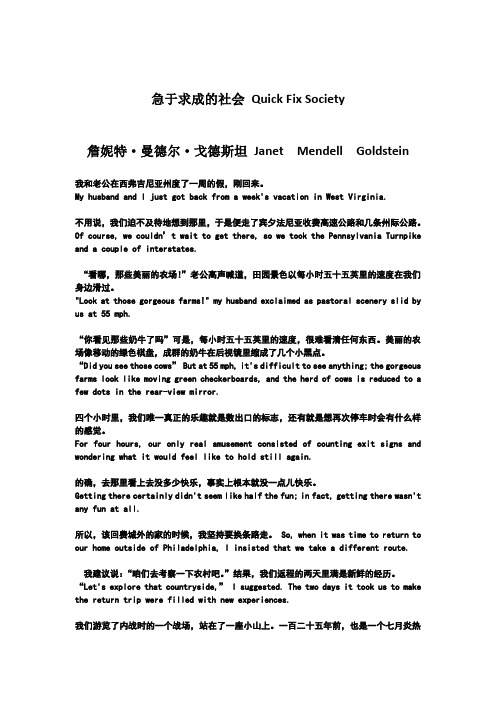
急于求成的社会Quick Fix Society詹妮特·曼德尔·戈德斯坦Janet Mendell Goldstein我和老公在西弗吉尼亚州度了一周的假,刚回来。
My husband and I just got back from a week's vacation in West Virginia.不用说,我们迫不及待地想到那里,于是便走了宾夕法尼亚收费高速公路和几条州际公路。
Of course, we couldn’t wait to get there, so we took the Pennsylvania Turnpike and a couple of interstates.“看哪,那些美丽的农场!”老公高声喊道,田园景色以每小时五十五英里的速度在我们身边滑过。
"Look at those gorgeous farms!" my husband exclaimed as pastoral scenery slid by us at 55 mph.“你看见那些奶牛了吗”可是,每小时五十五英里的速度,很难看清任何东西。
美丽的农场像移动的绿色棋盘,成群的奶牛在后视镜里缩成了几个小黑点。
“Did you see those cows” But at 55 mph, it's difficult to see anything; the gorgeous farms look like moving green checkerboards, and the herd of cows is reduced to a few dots in the rear-view mirror.四个小时里,我们唯一真正的乐趣就是数出口的标志,还有就是想再次停车时会有什么样的感觉。
For four hours, our only real amusement consisted of counting exit signs and wondering what it would feel like to hold still again.的确,去那里看上去没多少快乐,事实上根本就没一点儿快乐。
穷查理智慧书1(英语作文素材)
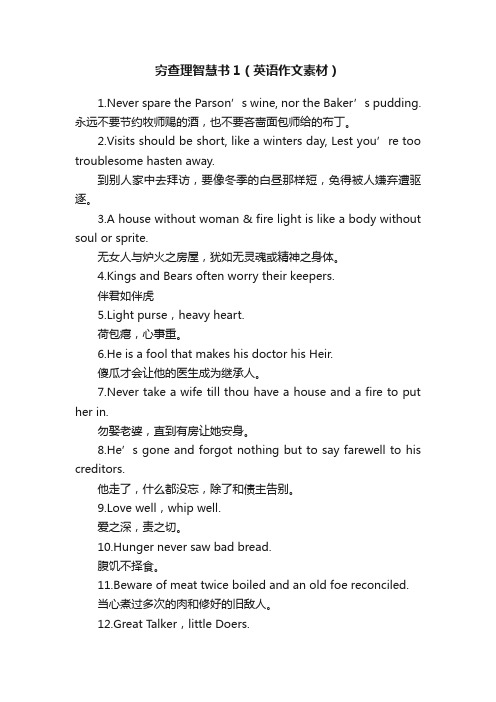
穷查理智慧书1(英语作文素材)1.Never spare the Parson’s wine, nor the Baker’s pudding.永远不要节约牧师赐的酒,也不要吝啬面包师给的布丁。
2.Visits should be short, like a winters day, Lest you’re too troublesome hasten away.到别人家中去拜访,要像冬季的白昼那样短,免得被人嫌弃遭驱逐。
3.A house without woman & fire light is like a body without soul or sprite.无女人与炉火之房屋,犹如无灵魂或精神之身体。
4.Kings and Bears often worry their keepers.伴君如伴虎5.Light purse,heavy heart.荷包瘪,心事重。
6.He is a fool that makes his doctor his Heir.傻瓜才会让他的医生成为继承人。
7.Never take a wife till thou have a house and a fire to put her in.勿娶老婆,直到有房让她安身。
8.He’s gone and forgot nothing but to say farewell to his creditors.他走了,什么都没忘,除了和债主告别。
9.Love well,whip well.爱之深,责之切。
10.Hunger never saw bad bread.腹饥不择食。
11.Beware of meat twice boiled and an old foe reconciled.当心煮过多次的肉和修好的旧敌人。
12.Great Talker,little Doers.说话的巨人,行动的矮子。
13.A rich rogue, is like a fat hog, who never does good till as dead as a log.有钱的恶人,如一只肥狗,从不行善直至死去。
- 1、下载文档前请自行甄别文档内容的完整性,平台不提供额外的编辑、内容补充、找答案等附加服务。
- 2、"仅部分预览"的文档,不可在线预览部分如存在完整性等问题,可反馈申请退款(可完整预览的文档不适用该条件!)。
- 3、如文档侵犯您的权益,请联系客服反馈,我们会尽快为您处理(人工客服工作时间:9:00-18:30)。
Vantiq–策略马蒂·斯普林泽恩–首席执行官
现代技术正在迅猛地改变着商业环境。
所有公司都在不断改善运营和制定创新产品的新型销售策略。
通过使用新的技术例如物联网、人工智能、移动电话、网络和边缘运算,农业、安保、环境安全和人身安全方面得以显著改善。
而且,每项工作必须高效完成,因为效率因素超越了规模因素,成为促使公司成功的助推器。
这就是数字化转型的世界,尝试数字化转型的团队如雨后春笋般涌现。
不幸的是,数字化转型实施起来很困难且通常以失败而告终。
麦肯锡公司报道称50%的数字化转型没能成功。
2016年1月7日,一篇标题为《为什么84%的公司数字化转型失败》的福布斯文章道破了一切。
近三年内,Vantiq打造了一款软件应用制作平台,以快速、成功地实现数字化转型。
通过Vantiq开发的应用可以对任何项目(例如水温感应器、入侵者图像、气象预报、社会媒体事件)进行实时分析并采取序步骤(例如关闭机器人、指派技师、产品发货、寻求帮助)。
Vantiq应用可扩展,十分可靠且安全。
在考虑性能、安全性和可靠性的情况下,为了满足软件运营意义的最大化,Vantiq应用支持云端、边缘或预置位置。
Vantiq为客户提供一种几天内或几周内制作应用的低层代码平台。
Vantiq在市场上的地位遥遥领先,且至少领先同行三年。
但是Vantiq并没有止步不前,而是不断努力。
到2018年末,通过引入项目存储目录和关联逻辑,可复用性将会达到高端水平。
例如,派生项目可以标识一个不是雇员的人,几个小时后,根据结果可以将其分类成可供多个其他应用程序使用的项目。
Vantiq目录有望显著增加该产品的利润,因为市场上没有其他类似的产品。
Vantiq在市场上受到客户的青睐。
2018年,Vantiq建立了无数的战略关系,荣获软件与信息产业协会最佳服务平台CODiE奖项并由高德纳咨询公司选为应用设计与开发最酷供应商(aPaaS)。
Vantiq创立之初就是一个完善的平台,这使得Vantiq实现了循环收益流和超低的客户流失率。
Vantiq主要参与产品研制方面的竞争,而且其将多种产品(5到10种)结合起来。
这
1
是一项复杂和冗长的工程,充满了风险。
通过Vantiq,很多尝试数字化转型的公司可在没有高级软件程序的情况下进行实验而且发展会更加迅速。
Vantiq的管理团队在探索巨大市场机遇、开发正确产品、增加在全世界范围内的业务运营方面取得了诸多成就。
Vantiq在早期的时候就在全世界建立了业务运营(美国、英国、法国、德国、中国、日本、巴西和以色列),现在势如破土。
Vantiq被选为在各种各样领域内建立高端技术应用的一种平台,包括农业、食品生产、机器人维护、财产管理、端口管理和现场服务等领域。
目录
Vantiq策略马蒂.斯普林泽恩–首席执行官 (1)
目录 (3)
注: (3)
背景 (4)
1
数字化转型新要求 (5)
前期简化应用开发所做的尝试 (6)
Vantiq—产品 (7)
Vantiq产品定义 (7)
Vantiq的任务关键性应用 (8)
Vantiq的人机协作 (9)
Vantiq创造的抽象 (10)
Vantiq的边缘功能 (11)
Vantiq创新—2018 (13)
Vantiq的使用 (13)
Vantiq样本使用案例 (13)
下一代实时软件应用 (14)
先发优势 (16)
市场进入壁垒—产品 (16)
竞争 (17)
市场进入壁垒—地理因素 (17)
Vantiq的市场策略 (18)
行业分析师的市场规模估计 (18)
Vantiq—市场机遇深入分析 (18)
Vantiq销售渠道 (19)
Vantiq—适合于所有规模的公司 (20)
服务平台(PaaS)和定价 (20)
Vantiq的经验 (20)
1
注:1.Vantiq要求该文件不应泄露给任何公司之外的范围。
2.该文件每个部分都单独编写,因此没有重复性内容。
背景
当今商业挑战
现代技术正在迅猛改变着当今商业环境。
过去几十年,规模是优秀商品公司的竞争优势。
但是如今的竞争规则大为不同:比起规模,效率更是促进公司成功的助推器。
大型公司必须学会如何在规模和速度之间保持平衡,并与在当前环境下蓬勃发展的新一代对手竞争,从效率低下的公司手中获得份额。
实现转型是必要的,但不容易。
学会如何让公司高效运转,对于效率低下的公司来说,规模较小的公司也是他们的竞争对手。
意识到这些挑战后,首席执行官们不断成立创新部门,雇佣首席数字官改善(创新)他们的行事方法和内容、重塑传统信息技术、设置内部风险资本以投资合伙人技术并获得技术产品。
然而真正贯彻创新理念的执行官非常少,因为创新是一件难事而且他们也没有经验。
麦肯锡公司报道称50%的数字化转型努力都失败了。
2016年1月7日,福布斯一篇文章标题为《为什么84%的公司数字化转型失败?》道破了一切。
1。
